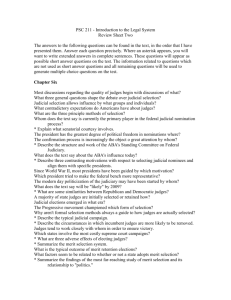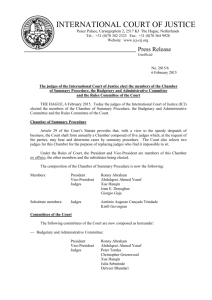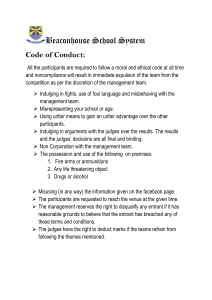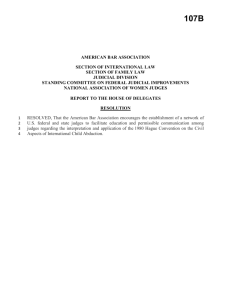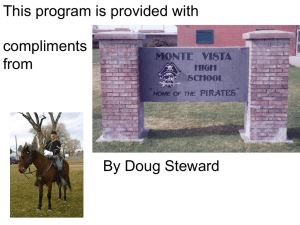107B - American Bar Association
advertisement
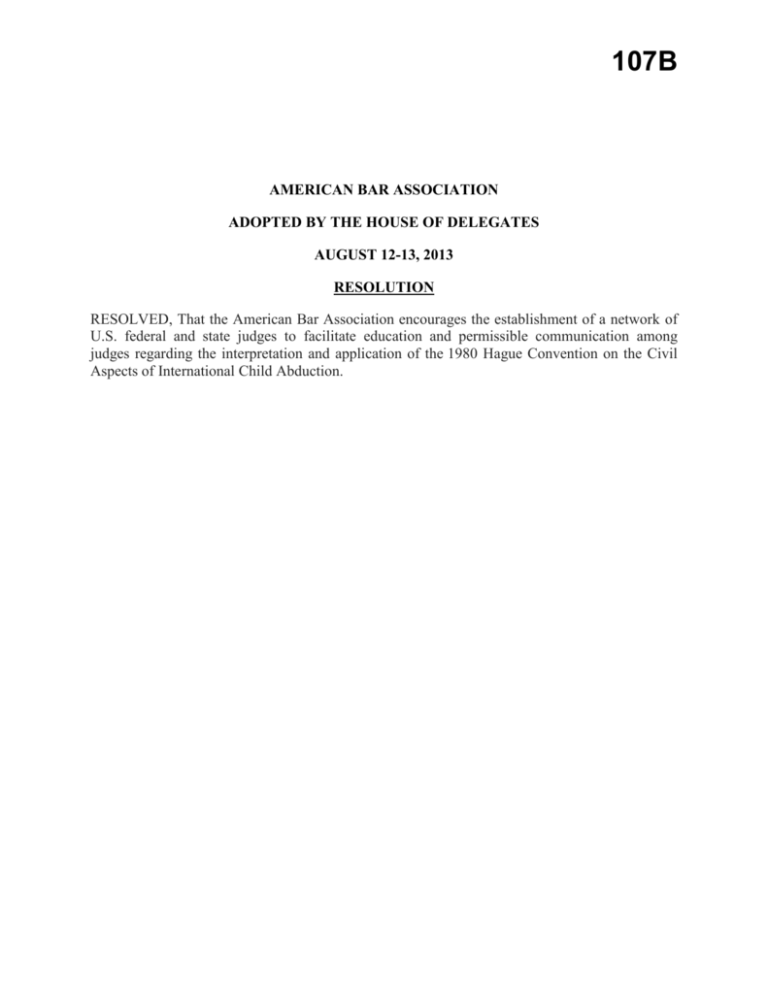
107B AMERICAN BAR ASSOCIATION ADOPTED BY THE HOUSE OF DELEGATES AUGUST 12-13, 2013 RESOLUTION RESOLVED, That the American Bar Association encourages the establishment of a network of U.S. federal and state judges to facilitate education and permissible communication among judges regarding the interpretation and application of the 1980 Hague Convention on the Civil Aspects of International Child Abduction. 107B REPORT A consequence of globalization has been an increase in the number of international family law cases. These cases frequently arise outside of urban centers and require judicial coordination with courts of other countries. This resolution encourages the establishment of a network to provide judges confronted with these cases, whether in the United States or abroad, a resource for addressing those cases that involve the United States. In 1980, the Hague Conference on Private International Law negotiated the 1980 Hague Convention on the Civil Aspects of International Child Abduction (“1980 Convention”), entered into force in 1983. The purpose of the 1980 Convention is to enable the civil remedy of a prompt return of children abducted from their habitual residence. In 1988, the United States ratified the 1980 Convention, which is currently implemented in the United States through the International Child Abduction Remedies Act (“ICARA”) (42 USC 11601 et seq). ICARA provides for U.S. state courts and U.S. federal district courts to have concurrent jurisdiction over actions brought in the United States under the 1980 Convention (42 USC 11603(a)). The Hague Conference meets approximately every five (5) years to discuss the implementation of the 1980 Convention in a “special commission meeting.” During the Hague Conference’s Fourth Special Commission Meeting in 2001, delegates discussed establishing a judicial network, comprised of judges from the various countries party to the 1980 Convention. The Conclusions and Recommendations of the Fourth Special Commission Meeting make a specific recommendation in this regard, stating, “5.5 Contracting States are encouraged to consider identifying a judge or judges or other persons or authorities able to facilitate at the international level communications between judges or between a judge and another authority.”1 The Hague Conference has established an international network comprised of judges from many of the parties to the 1980 Convention. The United States has currently recognized four (4) volunteer network judges to the Hague Conference, which include one state court judge from Florida, one state court judge from Missouri, one state court judge from California, and one federal court judge from Maryland. Foreign judges contact these four judges with questions about how matters related to the 1980 Convention are handled in U.S. courts. These judges are also available to assist U.S. judges with questions concerning such matters in the United States and abroad. The four U.S. network judges also work diligently to educate other U.S. judges in this complex and unique area of international family law. The United States’ four (4) network judges involved in the Hague Conference network have, however, occasionally encountered challenges in responding to inquiries from other countries’ judges, particularly when the request is concerning specific state laws or procedures which are outside the U.S. Hague Network Judges’ jurisdictions. Each court operates 1 See <http://www.hcch.net/upload/concl28sc4_e.pdf>. 1 107B differently, particularly on the state level. These different procedures can make it more challenging for the U.S. judges involved in the Hague Conference network to answer specific questions or obtain specific details about the courts where they do not sit. This recommendation proposes support for an intra-country judicial network, within the United States, that will serve as a mechanism for judicial communication and education about relevant international family law matters2. In fiscal year 2010, the U.S. Department of State reported 1,881 new cases of international parental child abduction (1,492 children abducted from the United States to a foreign jurisdiction and 389 children abducted to the United States from a foreign country3). While there are naturally more child abductions to major ports of call and border crossings in states such as California, Florida, Texas, and New York, children are abducted out of and into all U.S. states and territories. Establishing a wide-reaching domestic judicial network within the United States would improve communication and education in the judiciary and improve response time, proper interpretation of the 1980 Convention, and faster return of children abducted to or from the various U.S. jurisdictions. Other countries are exploring or have established similar intra-country networks4. The American Bar Association can promote, by adopting this resolution, a network that will help the judiciary, and serve as a resource for the U.S. Hague network judges in responding to requests from foreign judges. The State Department and the Section of International Law support efforts that will encourage communication between U.S. and foreign judges and education of our judiciary. The Conference of Chief Justices, Conference of State Court Administrators and the National Center for State Courts support an intra-country network. This resolution does not address ultimate implementation of a network, which is the next phase that would need to be addressed. This next phase will involve discussion among stakeholders and an assessment of what role the ABA may play in the network’s establishment, if any. Respectfully submitted, Barton Legum Chair, Section of International Law August 2013 2 The United States currently has a child custody jurisdiction law, the Uniform Child Custody Jurisdiction and Enforcement Act that contemplates and permits judicial communication from one court to another. (See UCCJEA Section 110). 3 Data provided by the U.S. Department of State, Bureau of Consular Affairs, Office of Children’s Issues in 2011. 4 See http://www.hcch.net/index_en.php?act=text.display&tid=69, accessed 9/19/12 and http://www.hcch.net/upload/news2008.pdf (page 38), accessed 9/19/12 2 107B GENERAL INFORMATION FORM Submitting Entity: Section of International Law Submitted By: Barton Legum, Chair, Section of International Law 1. Summary of Resolution(s). The resolution encourages the establishment of a U.S. judicial network to aid in permissible judicial communication and judicial education related to the 1980 Hague Convention on the Civil Aspects of International Child Abduction. 2. Approval by Submitting Entity. ABA Section of International Law – approved by Council in February 2013 3. Has this or a similar resolution been submitted to the House or Board previously? No. 4. What existing Association policies are relevant to this resolution and how would they be affected by its adoption? None. 5. What urgency exists which requires action at this meeting of the House? There is a rapidly growing need for a judicial network due to the increased mobility of the world’s population, which increases the incidence of cross-border family disputes. The United States has a disproportionate number of cases, and a more complex legal system through which the cases must operate. 6. Status of Legislation. (If applicable) Not Applicable. 7. Brief explanation regarding plans for implementation of the policy, if adopted by the House of Delegates. No plans to date. The policy does not require implementation by the ABA. 3 107B 8. Cost to the Association. (Both direct and indirect costs) None. 9. Disclosure of Interest. (If applicable) Not Applicable. 10. Referrals. ABA Section of International Law – approved by Council in February 2013 ABA Judicial Division – co-sponsorship approved by Council in February 2013 ABA Standing Committee on Federal Judicial Improvements – co-sponsorship approved by Committee in April 2013 National Association of Women Judges – co-sponsorship approved by Board in May 2013 Referred to ABA Family Law Section – awaiting discussion at its next Council meeting regarding co-sponsorship Will be referred to all other Sections and Divisions shortly. The Conference of Chief Justices (CCJ) has approved a similar resolution in the past. Referred to the National Center for State Courts (NCSC) and the National Judicial College (NJC). 11. Contact Name and Address Information. (Prior to the meeting) Melissa A. Kucinski, Esquire 720 Pettis Avenue Mountain View, CA 94041 (650) 260-5165 (650) 434-3778 fax Melissa@globalfamilymediation.com 4 107B 12. Contact Name and Address Information. (Who will present the report to the House?) ABA Section of International Law Delegates Glenn P. Hendrix Arnall Golden Gregory LLP Suite 2100 171 17th Street, N.W. Atlanta, GA 30363 Phone: 404/873-8692 E-Mail: glenn.hendrix@agg.com Jeffrey Golden London School of Economics Houghton Street London, WC2A 2AE United Kingdom Phone: 447785500811 E-mail: j.b.golden@lse.ac.uk 5 107B EXECUTIVE SUMMARY 1. Summary of the Resolution The resolution encourages the establishment of a U.S. judicial network to aid in permissible judicial communication and judicial education related to the 1980 Hague Convention on the Civil Aspects of International Child Abduction. 2. Summary of the Issue that the Resolution Addresses A consequence of globalization has been an increase in the number of international family law cases. These cases frequently arise outside of urban centers and require judicial coordination with courts of other countries. This resolution proposes encouragement of a network to provide judges a resource for addressing those cases that involve the United States. The United States has currently recognized four (4) volunteer network judges to the Hague Conference. Foreign judges contact these four judges with questions about how matters related to the 1980 Hague Convention are handled in U.S. courts. These judges are also available to assist U.S. judges with questions concerning such matters in the United States and abroad. The four U.S. network judges also work diligently to educate other U.S. judges in this complex and unique area of international family law. These judges, however, only comprise four of numerous jurisdictions where these cases may arise in the United States. 3. Please Explain How the Proposed Policy Position will address the issue Establishing a wide-reaching domestic judicial network within the United States would improve permissible communication and education in the judiciary and improve response time, proper interpretation of the 1980 Convention, and quick return of children abducted to or from the various U.S. jurisdictions. Other countries are exploring or have established similar intra-country networks. 4. Summary of Minority Views None expressed that were not addressed in the drafting of the resolution and its report. 6
